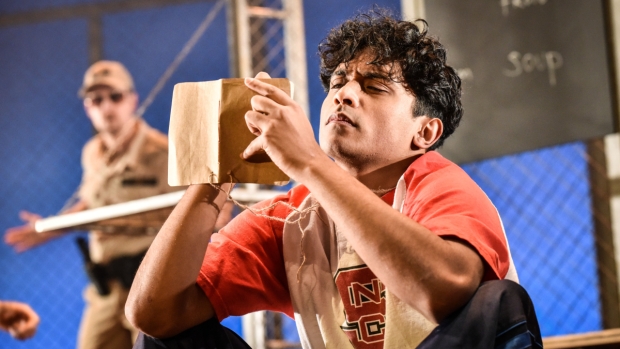The Bone Sparrow tour review – a loyal stage adaptation of Zana Fraillon's novel
The production is on tour until 23 April

© Robert Day
The Bone Sparrow is not an easy book to adapt and by and large Pilot Theatre and York Theatre Royal can be well pleased with what they have achieved. Zana Fraillon's novel poses the problems of symbolism, internal dialogue and imperfect understanding and S Shakthidharan does not shy away from any of them. The bone sparrow, the duck, the Night Sea are all there – and the tale of Oto and Anka benefits from some inspired visual effects, characters with giant heads miming the action and fierce soldiers menacing the married couple.
Sadly all this makes it too long. Running at 2 hours and 50 minutes (including interval), it seems likely to stretch the patience of the teenage audience it's aimed at. Taking 20 or 30 minutes off its running time would also sharpen its impact.
The play opens on Subhi's dream world, with images of his dreams projected onto the back wall. Then the cages close in on the refugee camp, moved to various patterns to indicate Subhi's tent, the general meeting area, the exterior fence and so on. The developments in the camp alternate with the periodic arrival of Jimmie, the girl from Outside who cannot read and has a need for stories. Her relationship with Subhi grows until the climax of the play – her illness and the camp riot. The adaptation once again stays true to the novel in not hurrying the events after that – one of which will inspire Subhi to correct action.
The adaptation is very loyal to the book, notably in its sparing, but important, connection to the Rohingya people. A few details differ, such as the greater involvement of Queenie, Subhi's sister, in the revolt at the camp. Siobhan Athwal is splendidly passionate in this slightly revised version of the character. The appearance of Subhi's father, left behind to die in Myanmar, seems totally appropriate.
A cast of eight carries the story, with assorted doubling as camp Jackets, figures in the tale of Oto and Anka, etc. Elmi Rashid Elmi's fierce Eli is especially striking. Mary Roubos, the voice of freedom, has probably too much to convey in her scenes with Subhi and seems always to be one step from the natural.
As for Subhi, Yaamin Chowdhury is excellent, mining his inner consciousness convincingly and moving on to purposeful action. He is aided (thwarted?) in this by Jummy Faruq as his Duck. The decision to give Subhi's duck stage time (as distinct from the novel where he contributes ridiculous – or not so ridiculous – asides into Subhi's brain) is one that will divide the critics. For me, I liked it, but wasn't sure about Jummy's extra-posh accent.
Esther Richardson's direction shows awareness of the problems, both in terms of getting this in front of an audience and – far greater – in the existence of refugee camps worldwide. If at some moments it goes too far into melodrama – the mad racing around to suggest the riot, for instance – then that seems justified.












